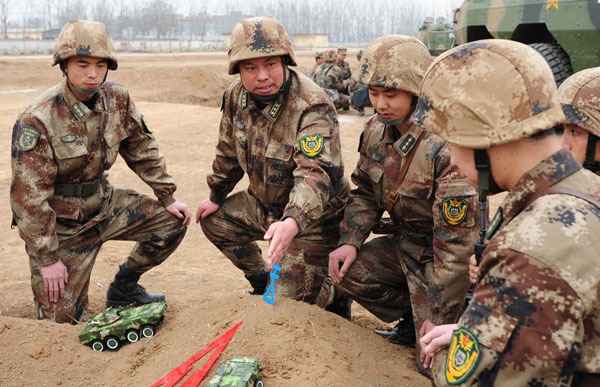Tough training forges 'iron army'
Updated: 2012-06-07 07:25
By An Baijie (China Daily)
|
|||||||||||
Regimental commander believes strict rules save soldiers in battle
Colonel Wei Deming knows how to steel the confidence of his military superiors when he gets a tough mission.
"Just give me one night, and I will give you a surprise," he tells them.
Wei is in charge of an emergency force under the Jinan Military Area Command, which is often referred to as the "Iron Army".
 |
|
Colonel Wei Deming, a regimental commander under the Jinan Military Area Command of the People's Liberation Army, explains tactics to his officers during a drill in Henan province. Provided to China Daily |
Living up to that billing requires a lot of hard training.
"When I was a soldier, my company commander used to say that only by following strict rules in daily exercises would soldiers lose less blood in a real battlefield," said the 40-year-old, who has been in the People's Liberation Army for 19 years.
"As a result, I'm always strict with myself and my soldiers."
Their training includes a range of exercises from testing weapons in the thin atmosphere of the Tibetan plateau to learning how to create a beachhead from the sea.
"Emergency forces should have the ability to overcome all kinds of difficulties and be ready to carry out missions at any time," said the colonel.
In the aftermath of the Wenchuan earthquake in 2008, with road infrastructure severely damaged, the regiment marched thousands of kilometers to carry out search and rescue missions.
Wei, the son of a rural family in Guangrao county, Shandong province, won recognition for his success in military competitions, and eventually became commander of the regiment.
"We servicemen always have strict rules to abide by, but Wei is even stricter with us," said Wang Shuo, a soldier from Wei's regiment.
Wang recalled marine training on a beach in Rizhao, Shandong, last year.
"We had thought it would be like a swimming carnival, just for us to learn how to swim," Wang said.
It turned out Wei had designed the training to be like a real battle involving skills for beachhead combat.
Last September, when Wei led a squad of soldiers to the plateau region of Tibet to carry out a series of missions, the high altitude proved to be a big challenge.
More than 90 percent of the soldiers developed symptoms like headaches, vomiting and sleeplessness the first day in the plateau region.
"I had to stop to take a breath when I walked every three steps," said Xu Xiaopeng, a company commander in the regiment.
"It felt like I had experienced all four seasons on the way to the high mountains in Tibet."
More serious side effects occurred three days later, when the squad started 3,000-meter runs. Even the soldier who had been a running champion fainted after less than 2,000 meters.
Wei re-arranged the exercise calendar, separated the soldiers into teams according to their physical condition, and made the exercise more suitable for the plateau region.
He also came up with an easy solution to have steam buns fully cooked at an altitude of 5,100 meters.
Under Wei's guidance, the soldiers gradually adjusted to military exercises on the plateau.
"We are trained to become an 'Iron Army,' which we are proud of," Wei said.
anbaijie@chinadaily.com.cn
Today's Top News
President Xi confident in recovery from quake
H7N9 update: 104 cases, 21 deaths
Telecom workers restore links
Coal mine blast kills 18 in Jilin
Intl scholarship puts China on the map
More bird flu patients discharged
Gold loses sheen, but still a safe bet
US 'turns blind eye to human rights'
Hot Topics
Lunar probe , China growth forecasts, Emission rules get tougher, China seen through 'colored lens', International board,
Editor's Picks

|

|

|

|

|

|





